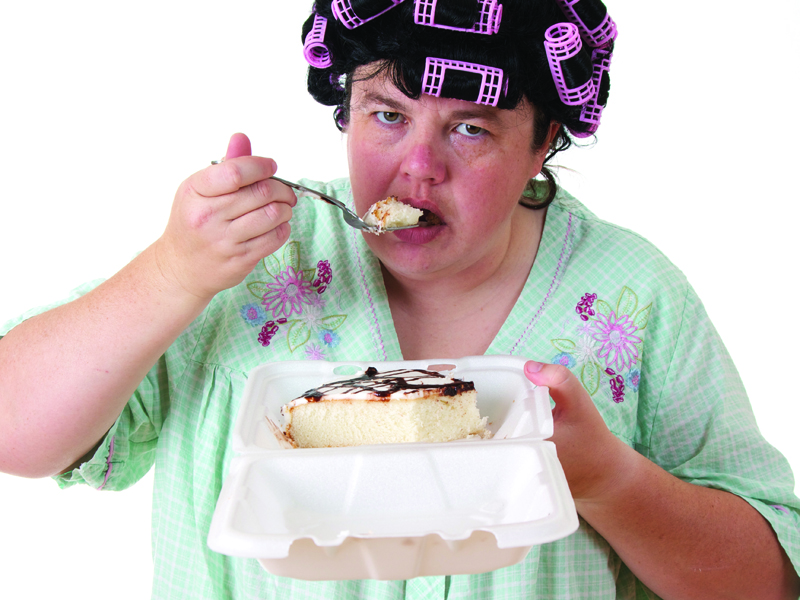Dieting failure is a serious problem for many overweight people. So why is there such a high rate of relapse?
What causes obesity? Is it a deficit of willpower, a disease or a metabolic disorder? Is it about poor eating habits, poor motivation or insufficient nutritional knowledge, or perhaps a lack of physical exercise?
How often as health professionals do we focus on diet and exercise when it comes to weight loss and weight management? Yet how often do we see that a large proportion of dieters regain the weight they lost, and often gain even more weight with each failed diet attempt.
Diets alone don’t work
We know that dieting can result in inappropriate hunger, rebound binge eating and changes in appetite for foods rich in sugar and fat. Dieting can also exacerbate the effects of our relationship with food that may already be troubled or inappropriate for weight control.
We also know that food restraint can lead to disinhibited and dysregulated eating. Disinhibited eating relates to the increased tendency to ignore appetitive cues and respond to non-appetitive cues such as emotions or the presence of palatable food. We call this kind of eating “opportunistic”. Dysregulation means that people start eating in response to these cues and become disconnected from the satiety cues that would encourage them to stop.
As a result, dieting and restricted eating is often not effective in the long term. Obesity is a complex problem with multiple factors and a one-size fits all solution cannot be applied. For instance, some people have genetic factors which may predispose them to be overweight, while others have medication-related weight problems. Some are disordered eaters with high levels of emotional eating; others have very sedentary lifestyles; some people are excited by food and thwarted by the obesogenic environment with few skills to defer their gratification.
When treating obesity, we need to remember that people bring different resources (pre-potencies) to their weight loss treatment, and confront different barriers to change. Our task as health professionals is to harness existing skills and teach others, while identifying personal challenges which make it hard to sustain change. These challenges and barriers may operate both internally and externally, proximally and distally in terms of cues to eat or cues not to move around.
With this in mind, we need to work towards personalising obesity treatment and identifying barriers to change that go beyond a focus on calorie consumption and quantity of food intake. We need to explore other factors such as, triggers for emotional eating, attitude, body image, meanings associated to foods, motivation levels, readiness for change, nutritional awareness and education, personal physiology, relationship dynamics, activity, self-esteem and confidence, resilience and coping skills, to name a few.
Emotional eating
With multiple factors at play, emotional eating is one of many key components that overweight people struggle with. Research suggests overweight people eat more in response to emotional events than those of normal weight. Eating may be adaptive in blocking or regulating unwanted feelings.
The neurotransmitter Neuropeptide Y (NPY) is expressed in the limbic system and affects our emotional experiences and subsequent memories of these. NPY is often described as a “hunger” promoter and is directly linked to emotional experience around consumption of food; other chemicals that influence hunger, such as serotonin and endorphins, also have a profound effect on mood.
It is thus not surprising that eating and mood can have a reciprocal influence and may lead some people to have difficulty distinguishing feelings of need and hunger. They may say, for example, they are hungry when they are really upset or sad.
Susie Orbach, a psychotherapist from the UK, describes various forms of eating which have a simple emotional intent. She suggests that overweight people lose touch with their “real hunger” and over-respond to these seven hunger variants:
• Social: an urge to eat when people are together
• Mouth: putting something in your mouth despite not being hungry
• Prophylactic: eating in case you get hungry later
• Deserved: cheering yourself up after a bad day
• Pleasure: to make yourself feel good
• Anxiety: to calm your nerves
• Celebratory: only way you know to enjoy an occasion
• Boredom: you can’t think of what else to do
For effective weight reduction and management, it is important for an individual to be able to distinguish between “real hunger” and these “other types of hunger”. While this can be difficult, there are clues to look for that can help distinguish between
the two:
Emotional hunger comes on suddenly: There is an instant overwhelming sense of urgency. Physical hunger, on the other hand, comes on more gradually. The urge to eat doesn’t feel as dire or demand instant satisfaction.
You crave specific comfort foods: You crave junk food or sugary goods that provide instant gratification and a rush. You feel like you need ice cream or pizza and nothing else will do. However, when you are physically hungry, you are happy to eat almost anything — including healthy foods such as vegetables.
Emotional hunger often leads to mindless eating: Before you know it, you’ve eaten a whole bag of chips, an entire block of chocolate or an entire tub of ice cream without paying attention to the quantity or fully enjoying it. When you’re eating in response to physical hunger, you’re typically more aware of what you’re doing.
Emotional hunger isn’t satisfied once you’re full: You keep wanting more and more, often eating until you’re uncomfortably full. With physical hunger, you feel satisfied when your stomach
is full.
Emotional hunger isn’t located in the stomach: Rather than a growling belly or a pain in your stomach, you feel your hunger as a craving you can’t get out of your head. You’re focused on specific textures, tastes, and smells.
Emotional hunger often leads to regret, guilt, or shame: When you eat to satisfy physical hunger, you’re unlikely to feel guilty or ashamed because you’re simply giving your body what it needs. If you feel guilty after you eat, it’s likely because you know deep down that you’re not eating for nutritional reasons.
People who suffer from obesity often struggle in recognising their hunger signs, let alone being able to distinguish “real” from “other types of hunger”. Simply focussing on reducing calorie intake by going on a diet is therefore not effective, as we are not addressing psychological aspects that come into play.
To help people lose weight, we need to look beyond the simplicity of ‘energy-in’ versus ‘energy-out’.
Interventions that work
Mindful eating and cognitive behavioural interventions can assist in shifting attitudes, thoughts and feelings towards food, as well as resolve troubled relationships with food that often result in weight gain. Mindful eating is eating with intention and attention. It is more than simply eating slowly without distraction. Mindful eating encompasses an entire process:
• Awareness of your physical and emotional cues
• Recognition of your non-hunger triggers for eating
• Learning to meet your needs in a more effective way than eating
• Eating for satiety
• Choosing foods for both enjoyment and nourishment
• Using the fuel you consumed to live the life you want
Many overweight people have a troubled relationship with food and react mindlessly to their unrecognised triggers, thoughts and feelings. They react by repeating past patterns and often feel powerless to change. Mindfulness and CBT can help in breaking old habits or habitual chain reactions and assisting in discovering alternative strategies that are more effective in long-term weight management.
We also need to explore the meanings people attach to foods. Some may be helpful and normal, while others will invariably promote obesity if allowed to dominate eating behaviour.
At its most basic level, food is a fuel designed to keep us alive and provide energy for our physical function, but we have developed a capacity to enjoy it. Few people eat solely to live, but far more of us live to eat. Each individual develops a complex set of meanings toward food that are invariably elastic across contexts but stable for that person over time. This means, for example, that a person may think of a packet of crisps as a fun food at a picnic but very undesirable during a normal working day.
One of the many influences on the meanings of food is the food script, a complex set of messages that comes from how food is used in social contexts as we grow up. We develop associations to foods as a result of many different factors such as:
• Our genetic taste sensation
• Conditioned responses
• Modelling eating behaviours of others
• Associations of foods with good and bad situations from past experiences

There are also some emotional links to food that can be unhelpful such as:
Food as reward: You can be rewarded for your eating behaviour or rewarded with food, ie “if you do your homework I will give you some chips”.
Having fun and belonging: Food being symbolic of family togetherness and traditions i.e. “dad cooked and baked a lot and most of our joy and happiness was getting together as a family
and eating”.
Deprivation: A perception that you would otherwise be deprived of food i.e. “if I did not eat quickly like my brothers there would be no seconds left for me”.
Emotional comfort: Using food to relieve unbearable emotions i.e. “I was numb when I was eating and did not feel anything and that felt good”.
On this basis, we need to also understand the obesity mindset, as each person brings a unique combination of unhelpful attitudinal elements to treatment.
Cognitive behavioural therapy focuses on element such as dieting syndrome (“I’ve blown it”), faulty thinking styles (generalisation, personalisation, faulty inference), flawed value systems and negative self-evaluations (“I’m pathetic because I can’t stop eating”).
For treatment to be effective, we also need to teach people how to recognise and deal with thoughts and attitudes which destroy good intentions.
We also need to help clients to be kinder to themselves during the weight loss process and help them cope with setbacks or relapses without being plagued by guilt and failure.
Conclusion
When treating people with obesity, not only do we need to be making changes to what and how much our patients eat, but we also need to understand the psychological aspects and schemas developed from early childhood which come into play and shape their eating habits over time. For most people, there is no getting away from the fact that to lose weight and maintain weight loss, we need to change many things about the way we live, in particular our dietary habits, exercise, and attitudes to make things work.
We also need to make permanent and enduring changes to lifestyle and to food-related activities with other people. But most of all, we need to understand our psyche, our attitudes and beliefs, and our relationship with food which drives our habits and rituals.
Tanja Limnios is a consultant psychologist for Thinkahead Consultant Psychologists


